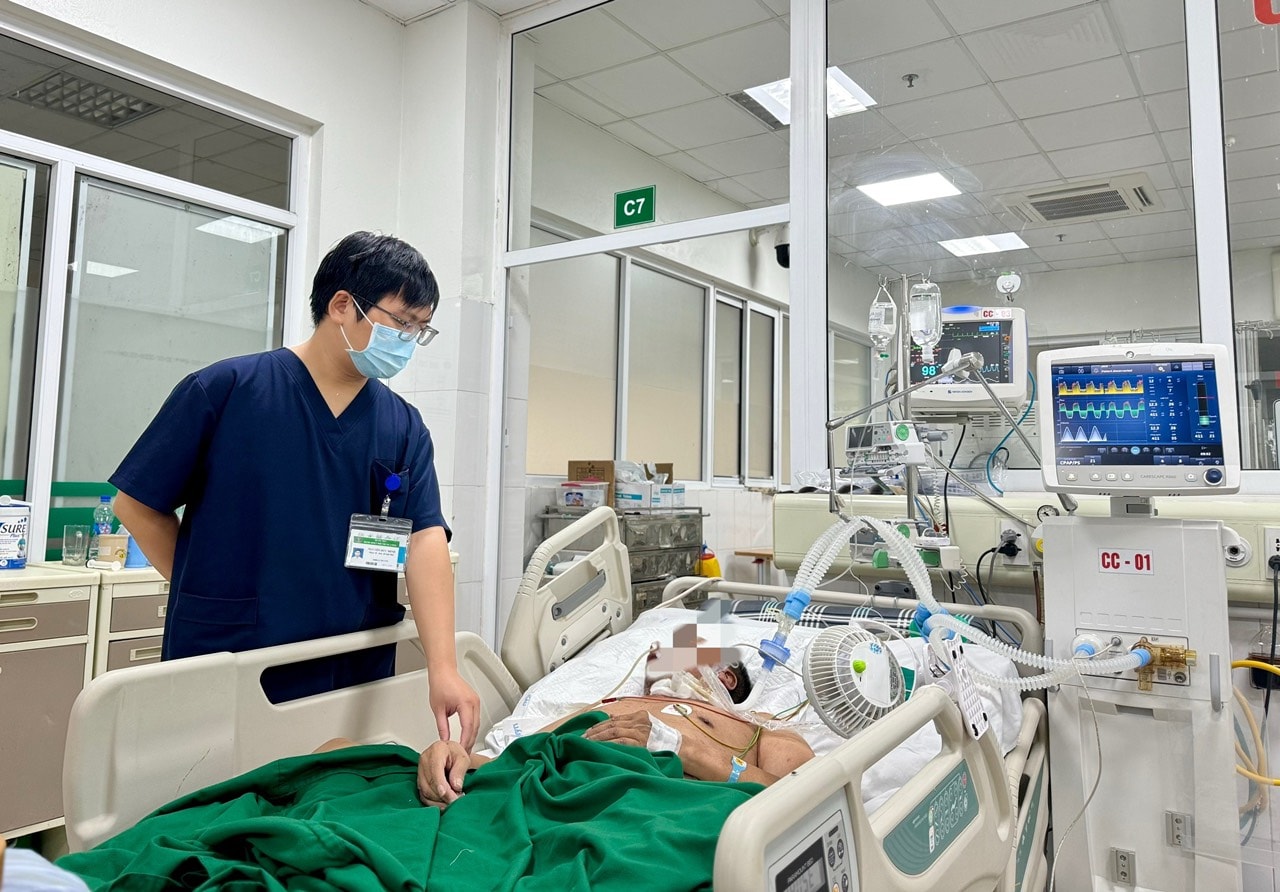According to information from the Central Hospital for Tropical Diseases, the hospital's Emergency Department is treating nearly 10 cases of patients with severe tetanus.

The common characteristics of these patients are that they have not been vaccinated and all have open wounds that they do not treat thoroughly at home, leading to tetanus infection. When severe symptoms such as jaw stiffness appear, the patients are hospitalized for treatment.
Specifically, there are some severe cases such as: Male patient (66 years old, in Hai Duong), hospitalized on July 27. 1 month ago, the patient was stabbed in the leg by a thorn and treated it at home. The patient did not get a tetanus shot. When he had symptoms of jaw stiffness and difficulty swallowing, the patient was hospitalized for treatment. Then it progressed to severe symptoms with symptoms of muscle stiffness throughout the body, respiratory failure, requiring intubation and mechanical ventilation.
Male patient (64 years old, Thai Binh) had underlying hypertension and heart failure. About 7 days before admission, the patient had a wound on his right forearm due to daily activities. After 3 days, the patient began to have stiff jaw, difficulty swallowing and it progressed to severe. When admitted to the hospital, the patient was also in a state of general stiffness, had to be placed on a ventilator and had low blood pressure.
Or the case of patient MTH (65 years old, in Bac Ninh), admitted to the hospital on June 27, with a history of diabetes and hypertension. About 8 days before admission, the patient was stabbed in the right finger by a piece of wood and treated it himself with water and a bandage, leading to a festering wound. The patient went to the medical facility with difficulty opening his mouth and jaw stiffness and was then referred to the Central Hospital for Tropical Diseases because of suspected tetanus. The patient was admitted to the hospital with obvious generalized tetanus. In addition to jaw stiffness, the patient also had severe generalized muscle hypertonia (generalized muscle stiffness), with the onset of seizures and chest tightness causing difficulty breathing (a sign of respiratory muscle damage). The patient was immediately intubated by the Emergency Department, using many types of sedatives, pain relievers, and muscle relaxants to control the seizures.
To date, after a month of intensive treatment, the patient has gradually stabilized, completely stopped taking sedatives and muscle relaxants, and stopped experiencing muscle stiffness and spasms. The patient's kidney function has also returned to normal, the patient can breathe on his own, and the associated infections and dysfunctions have been controlled.
Dr. Nguyen Duc Minh, Emergency Department, Central Hospital for Tropical Diseases said: “People with tetanus often have initial symptoms of jaw stiffness and difficulty opening the mouth, which then spreads to the muscles, making the patient unable to walk. In severe cases, the disease can lead to stiff convulsions, if not treated promptly, it will lead to respiratory failure and rapid death due to chest tightness, broken bones, and muscle ruptures.”
Accordingly, the incubation period of tetanus can last from several days to several months. Therefore, people need to pay attention to tetanus vaccination, especially when having open wounds. Self-treatment of wounds at home can lead to serious and life-threatening complications. In case of suspected tetanus, go to a medical facility immediately for timely examination and treatment.
According to Dr. Nguyen Duc Minh, for people with tetanus, if treatment is successful, the patient needs to get a booster shot of the vaccine 1 month after discharge from the hospital and every year or 10 years, or get the shot immediately after a new contaminated open wound.
Tetanus has 3 stages of disease progression: Acute stage, recovery stage and post-recovery prevention to avoid recurrence. The severity of recurrence will depend on the patient's constitution and the nature of the contaminated wound. Almost all tetanus patients experience muscle weakness due to prolonged lying down, poor nutrition, malabsorption in tetanus and muscle atrophy. In these cases, the recovery time is also quite long. Therefore, it is necessary to actively supplement nutrition through food, intravenous fluids and rehabilitation exercises..."